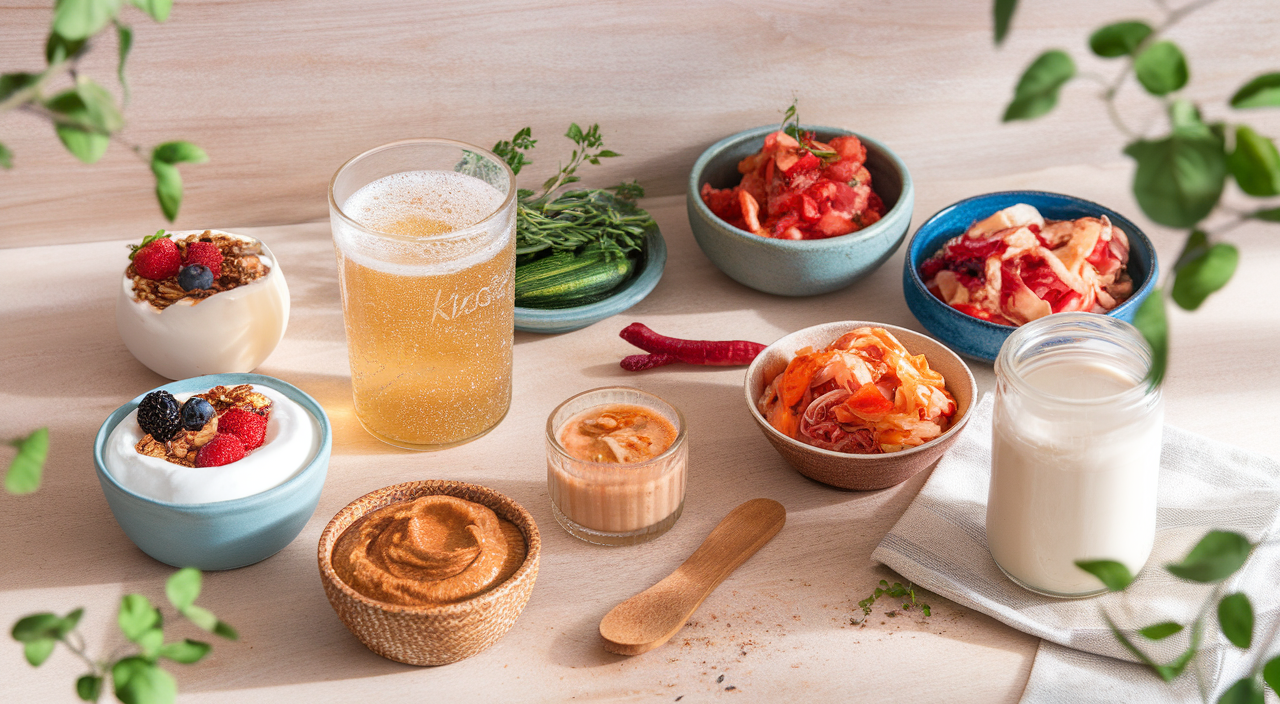How To Improve Gut Health With Fermented Foods you ask, Fermented foods act as powerful gut health allies, backed by Stanford research demonstrating increased microbiome diversity and lower inflammation markers after just 10 weeks.
These probiotic-rich foods introduce beneficial bacteria to your digestive system, boosting immunity and enhancing nutrient absorption when added regularly to your meals.
Key Takeaways
- Start small with 1-2 tablespoons of fermented foods daily, gradually increasing to 2-3 servings spread throughout the day for maximum benefits.
- Choose unpasteurized fermented foods with “live active cultures” like yogurt, kefir, kimchi, kombucha, and miso to ensure you’re getting active beneficial bacteria.
- Incorporate variety in your fermented food choices to expose your gut to diverse probiotic strains, rotating options throughout the day.
- Allow 2-3 weeks for adjustment and introduce only one new fermented food at a time to monitor tolerance and benefits.
- Beyond gut health benefits, fermented foods offer improved nutrient absorption, better cardiovascular markers, and support for healthy weight management.
I’ve found that adding fermented foods to my daily routine has transformed my digestive health. The science confirms what many cultures have known for centuries—these foods create a thriving gut environment that supports whole-body health. The key lies in consistent consumption and smart selection of products containing live cultures.
Fermented Foods Are Your Gut’s Best Friend
How to Improve Gut Health with Fermented Foods: The Science
Fermented foods pack a powerful punch when it comes to supporting digestive wellness. A groundbreaking Stanford study revealed that following a fermented food diet for just 10 weeks significantly boosted microbiome diversity. The research showed impressive results — a reduction in the activation of 4 key immune cells and a decrease in 19 inflammatory proteins.
The study specifically highlighted a reduction in interleukin-6, a protein closely tied to conditions like diabetes and arthritis. This finding explains why I’ve seen such positive results when incorporating fermented foods into my daily routine.
Best Practices to Improve Gut Health with Fermented Foods
I’ve found that starting small and gradually increasing fermented food intake works best. Here are my top recommendations for incorporating these powerful foods into your diet:
- Start with 1–2 tablespoons of sauerkraut or kimchi daily
- Add a small serving of kombucha as a mid-day drink
- Include probiotic-rich yogurt in your weekly meal prep
- Mix fermented vegetables into your favorite salads
- Try kefir as a breakfast smoothie base
The growing interest in fermented foods isn’t just a trend — nearly one-third of Americans actively seek out probiotic-rich foods to support their gut health. I’ve discovered that keeping fermented foods visible in your fridge makes it easier to incorporate them into meals.
For beginners, I recommend starting with milder options like yogurt or kombucha before moving on to stronger flavors. You can even turn it into a fun experience by creating gut-healthy snack combinations with your favorite fermented foods.
Remember to introduce these foods slowly to allow your digestive system to adjust. The key to improving gut health with fermented foods lies in consistency rather than quantity — small, regular portions will yield better results than sporadic large servings.
POWER-PACKED FERMENTED FOODS AND THEIR BENEFITS
Top Fermented Foods to Improve Gut Health
I’ve discovered that learning how to improve gut health with fermented foods starts with understanding the powerhouse options available. By incorporating specific fermented foods into your daily routine, you’ll notice significant improvements in your digestive wellness.
Yogurt leads the pack as a fantastic starter option for anyone beginning their gut health journey. It’s packed with beneficial Lactobacillus and Bifidobacterium strains, making it perfect for healthy snacking throughout the day.
Kefir takes things up a notch with its impressive 61 unique bacterial strains. This fermented drink actually packs more probiotic punch than yogurt, making it an excellent choice for those serious about how to improve gut health with fermented foods.
Here are the key fermented foods you should consider adding to your weekly grocery list:
- Kimchi – Rich in diverse lactic acid bacteria and perfect for adding to salads
- Kombucha – Contains beneficial mixed yeasts and bacteria (choose unpasteurized versions)
- Miso – Features Aspergillus oryzae (tip: avoid boiling to keep cultures alive)
Maximizing the Benefits of Fermented Foods
I’ve found that strategic incorporation of these foods makes a real difference. Planning your meals ahead helps ensure you get the recommended three daily servings needed to reduce bloating and improve digestion.
For optimal results, I suggest spreading your fermented food intake throughout the day. Start with yogurt at breakfast, add kimchi to your lunch, and include kefir as an afternoon drink. This approach helps maintain a steady supply of beneficial bacteria to your gut.
Remember to pay attention to your body’s response to these foods as you introduce them. Start with small portions and gradually increase your intake. This method helps your digestive system adjust while maximizing the benefits of these powerful foods.
When selecting fermented foods, opt for raw, unpasteurized versions where possible, as these contain the highest levels of beneficial bacteria. Store them properly in your refrigerator to maintain their probiotic content and ensure maximum effectiveness in improving your gut health.
Start Your Fermented Food Journey The Right Way
How to Improve Gut Health with Fermented Foods Gradually
Starting a fermented food journey requires a smart, step-by-step approach to let your digestive system adjust. I recommend beginning with just one serving daily – like a cup of yogurt or glass of kefir. This measured approach helps minimize potential digestive discomfort while still providing benefits. Just as I carefully balance my skincare microbiome, the same thoughtful approach applies to incorporating fermented foods.
Master Your Daily Fermented Food Routine
Once your body adapts, I suggest building up to 2-3 servings daily to maximize the gut-health benefits. Creating an organized meal prep routine makes it easier to incorporate these foods consistently. Learning how to improve gut health with fermented foods becomes simpler when you follow these essential guidelines:
- Always check labels for “live active cultures” – this confirms beneficial probiotics
- Skip shelf-stable or pasteurized versions as they lack live bacteria
- Mix up your choices between kimchi, kombucha, sauerkraut, and other options
- Start with small portions (1–2 tablespoons) of stronger ferments like kimchi
- Allow 2–3 weeks for your gut to adjust to the new additions
When restocking your fridge, I recommend rotating between different fermented foods to get diverse probiotic strains. This variety is key to improving gut health with fermented foods effectively. While mild bloating is normal initially, track your body’s reactions carefully.
Creating a balanced snack routine that includes fermented foods can make this healthy habit more enjoyable. I suggest spreading servings throughout the day rather than consuming them all at once. This approach helps maintain a steady supply of beneficial bacteria while preventing digestive overload.
Remember to introduce only one new fermented food at a time. This method helps identify which foods work best for your system and which might cause sensitivity. Pay attention to factors like serving size, timing, and combinations with other foods to optimize your fermented food journey.
Easy Ways to Add Ferments to Your Daily Meals
How to Improve Gut Health with Fermented Foods at Breakfast and Lunch
Starting your day with fermented foods doesn’t have to be complicated. I’ve found that adding a generous dollop of probiotic-rich yogurt to my morning smoothies creates a creamy texture while supporting digestive health. You can create beautiful breakfast bowls with yogurt topped with fresh fruits and granola for an Instagram-worthy start to your day.
For lunch, I love incorporating gut-friendly ferments into sandwiches and wraps. Adding kimchi or sauerkraut brings a tangy crunch that transforms ordinary sandwiches into probiotic powerhouses. These fermented vegetables are perfect for stocking your fridge and having ready to go.
How to Improve Gut Health with Fermented Foods in Main Meals and Snacks
Dinner offers countless opportunities to include fermented foods. Here are my favorite ways to incorporate them:
- Mix miso paste into soups, broths, and marinades
- Add tempeh to stir-fries and grain bowls
- Include fermented vegetables as side dishes
- Use raw apple cider vinegar in homemade dressings
- Serve kimchi as a flavor-packed condiment
For snacks and beverages, I’ve discovered that incorporating probiotic drinks like kombucha or kefir makes healthy snacking simple. These drinks offer a fizzy alternative to sodas while supporting gut health. You can even blend them into smoothies for an extra probiotic boost.
The key to improving gut health with fermented foods is making them a regular part of your diet. I recommend starting with one fermented food per day and gradually increasing your intake. Pay attention to how your body responds to these probiotic-rich foods, as they can significantly impact your digestive system and overall well-being.
Maximizing the Health Benefits of Fermented Foods
How to Improve Gut Health with Fermented Foods for Disease Prevention
I’ve discovered that fermented foods pack a powerful punch when it comes to strengthening your immune system. These probiotic-rich foods create a protective barrier in your gut, making it harder for harmful bacteria to take hold. Just like maintaining a balanced skin microbiome, your gut needs the right balance of beneficial bacteria.
The magic of fermentation doesn’t stop there. Your body becomes better at absorbing essential nutrients when you regularly consume fermented foods. This enhanced absorption means you’ll get more vitamins and minerals from the foods you eat, particularly B-vitamins and minerals like zinc and iron.
How to Improve Gut Health with Fermented Foods for Better Health Markers
Let’s talk about the impressive impact on your cardiovascular health. Adding fermented foods to your well-planned meal prep routine can help:
- Lower your blood pressure naturally
- Reduce cholesterol absorption in your gut
- Decrease your risk of type 2 diabetes
- Improve overall heart health markers
Here’s something fascinating – regular yogurt consumption has been linked to a smaller waist size. While organizing your aesthetic fridge restock, I recommend keeping probiotic-rich yogurt front and center. The active cultures in fermented foods can help regulate your metabolism and support healthy weight management.
The key to maximizing these benefits lies in consistency. I’ve found that incorporating various fermented foods into your daily snack routine ensures you’re getting a diverse range of beneficial bacteria. Remember, each type of fermented food brings its own unique strains of probiotics, so variety is crucial.
The beauty of using fermented foods to improve gut health lies in their versatility. From tangy kimchi to creamy kefir, you’ve got plenty of delicious options to choose from. Start with small portions and gradually increase your intake to let your digestive system adjust to these powerful foods.
Incorporating yogurt, kimchi, and other probiotic-rich options like those in fermented foods can help balance your digestive system and support overall well-being.
Sources:
National Institutes of Health – “Fermented Foods & Your Health: Gut Microbiome”
Stanford Medicine – “Fermented food diet increases microbiome diversity”
Consumer Reports – “Benefits of Fermented Foods”
UCI Health – “Boost Your Gut Health with Fermented Foods”
Frontiers in Microbiology – “Fermented Foods: Perspective”
Olive My Pickle – “How to Avoid Bloating with Fermented Food”
ScienceDirect – Topics in Food Fermentation










